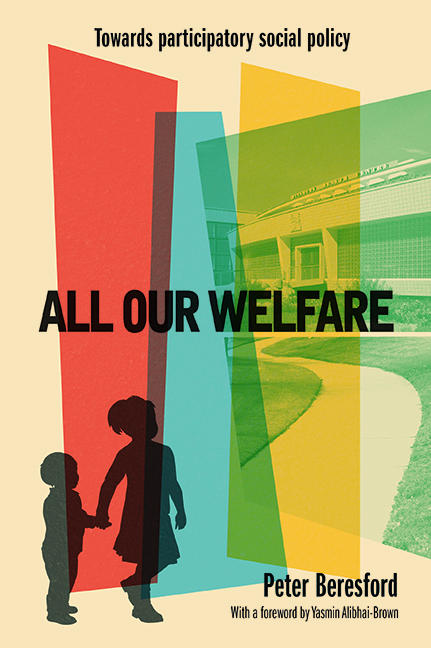Book contents
- Frontmatter
- Contents
- List of photographs and sources
- Foreword
- Dedication
- Acknowledgements
- Introduction Owning not othering our welfare
- Part One The legacy of the past
- Part Two The way to the future
- Afterword The future: a different way forward?
- Appendix One The family
- Appendix Two Research projects and related publications
- References
- Index
Nine - The beginnings of something different
Published online by Cambridge University Press: 01 September 2022
- Frontmatter
- Contents
- List of photographs and sources
- Foreword
- Dedication
- Acknowledgements
- Introduction Owning not othering our welfare
- Part One The legacy of the past
- Part Two The way to the future
- Afterword The future: a different way forward?
- Appendix One The family
- Appendix Two Research projects and related publications
- References
- Index
Summary
I am proposing the formation of a consumer group to put forward nationally the views of actual and potential residents of these successors to the workhouse. We hope in particular to formulate and publicise plans for alternative kinds of care. I should be glad to hear from anyone who is interested to join or support this project. – Yours faithfully,
(Paul Hunt, letter to the Guardian, 20 September 1972, that led to the establishment of the British Disabled People’s movement)In the last chapter, we saw how mainstream social policy has historically largely ignored the first-hand accounts and experience of those on the receiving end of social policy or reinterpreted them as it has seen fit. We have learned about the enduring tradition of analysts and social explorers offering their own interpretations of the views and lives of poor and dispossessed people. Finally, we encountered new generations of social commentators in the second half of the twentieth century who sought to privilege people’s own accounts. This can also be seen as part of a much broader development of seeking to access the first-hand voices of marginalised groups and people, as well as them seeking to develop and offer their own accounts themselves. It represents a major attempt to enable people to speak for themselves, instead of being spoken for – the beginning of a fundamental change for social policy.
Accessing people’s views, people’s histories
This commitment to foreground the lives and activities of ‘ordinary’ and marginalised people came to prominence from the late 1960s to the 1980s. It can be seen as linked to two developments. First, these were times of fundamental political and economic change that particularly threatened disadvantaged individuals, communities and regions. Second, they were also associated with the emergence of the new social movements: the women’s, black civil rights and LGBT (lesbian, gay, bisexual and transgendering) movements. These all challenged oppressive dominant white heterosexist conceptualisations of themselves and developing their own critiques and analyses of their lives and their positions in society.
There were earlier precedents for such grassroots accounts and histories, in the nineteenth and early twentieth centuries, with such writers emerging through adult education classes, political clubs, trade unions, local libraries and other initiatives (Pollard and Smart, 2012, 22), but they flowered in the latter part of the twentieth century.
- Type
- Chapter
- Information
- All our WelfareTowards Participatory Social Policy, pp. 173 - 196Publisher: Bristol University PressPrint publication year: 2016

